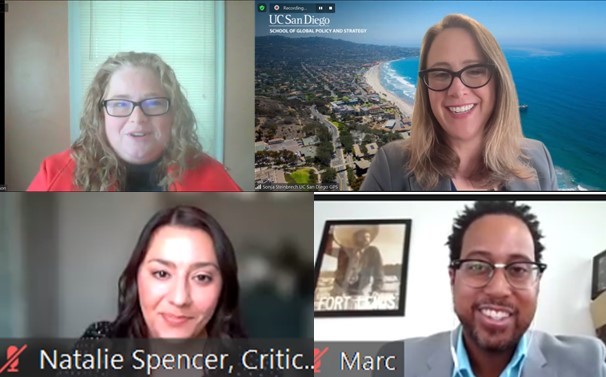APSIA Welcomes Spring 2022 PISA Advisors
From March 28 – April 1, 2022, APSIA welcomed 174 advisors to the annual 2022 Public and International Service Advisor (PISA) Spring Training Workshop.
Monday, March 28 kicked the week off with a look at the many career opportunities within international affairs. Elise Goldwasser, Undergraduate Internship Program Director at Duke University’s Sanford School of Public Policy, hosted a conversation between alumni Alexious Butler, Acting Deputy Assistant Administrator at USAID’s Bureau for Resilience and Food Security, Theodore Caruthers, Senior Consultant at Booz Allen Hamilton, and Mark Ritchie, President of Global Minnesota.
Each panelist had taken a very different path into the field. One initially thought they would head to law school, because mentors and advisors equated her interest in political science with the law profession. She opted instead to do her own research and found her way into international development. Another panelist spoke to the impact of an experience during high school that exposed him to global issues. Despite the different ways in, panelists encouraged students to explore the breadth of academic and career opportunities available in international affairs. They hoped advisors would challenge students to take the initiative and forge their own path.
On Tuesday, March 29, Beth Soboleski, Director of Admissions and Recruitment at the University of Michigan Ford School of Public Policy compared the landscape of professional graduate degrees in public and international service.
“Our field uses many different names to describe the same type of [graduate] program structurally. It is a confusing landscape to say the least, but - if we can’t rely on the names of the programs [to understand its structure] - consider the names [of the program’s required] courses.” She also advises students to ask, “Does this [program] align with what I want?”
On Wednesday, March 30, Marc St. Hilaire, Executive Recruiter at the Federal Reserve Bank of Richmond, Natalie Spencer, Assistant Manager of Critical Language Scholarship Outreach and Selection at the American Councils for International Education, and Sonja Steinbrech, Director of Degree Program Enrollment at UCSD School of Global Policy and Strategy, shared their insights on how students can articulate their experiences to make them stand out in job, fellowship, and graduate school applications. Moderated by Tammara Wickson, Academic Advisor in the Rochester Institute of Technology College of Liberal Arts, the panelists encouraged students to go for those [fellowship, scholarship, and other etc.] opportunities, because the application process is a learning opportunity in itself, they said. Students learn about themselves, as well as how to better articulate their story over time.
Later that on Wednesday, APSIA also hosted an open discussion moderated by Francine D'Amico, Director of Undergraduate Studies at the Syracuse University Maxwell School. For example, advisors brainstormed local opportunities for students to connect with global issues, such as working in immigration assistance, advancing international trade, hospitality and tourism, and language interpretation services. These opportunities also help Plus, students gain writing skills, briefing and public speaking skills, cross-cultural adaptability, and foreign language competencies.
Thursday, March 31’s conversation between Shannon Chapman, Assistant Dean for Enrollment and Student Services at The University of Texas at Austin LBJ School of Public Affairs, Victoria Perez de Agreda, Associate Director of the New York Center at IE University School of Global and Public Affairs, and Annie Thompson, Assistant Director of Graduate Enrollment at the University of Denver Josef Korbel School of International Studies, focused on ways to make graduate school accessible and affordable. Moderated by Elise Goss-Alexander, Assistant Director of Student Employment at the University of Denver, panelists also shared how students and advisors may discern between programs based on professional fit, financial aid, and desired learning opportunities.
APSIA concluded the week with a look at what APSIA is and how PISA assists advisors. Carmen Iezzi Mezzera, APSIA’s Executive Director, and International Admissions and Operations Manager Briana Suarez shared APSIA’s events, resources, and many ways they help advisors bring public and international service-related content to their campuses.
Recordings of the week’s sessions can be found on APSIA’s YouTube page.
APSIA would like to thank the Robertson Foundation for Government for its on-going support of PISA.

